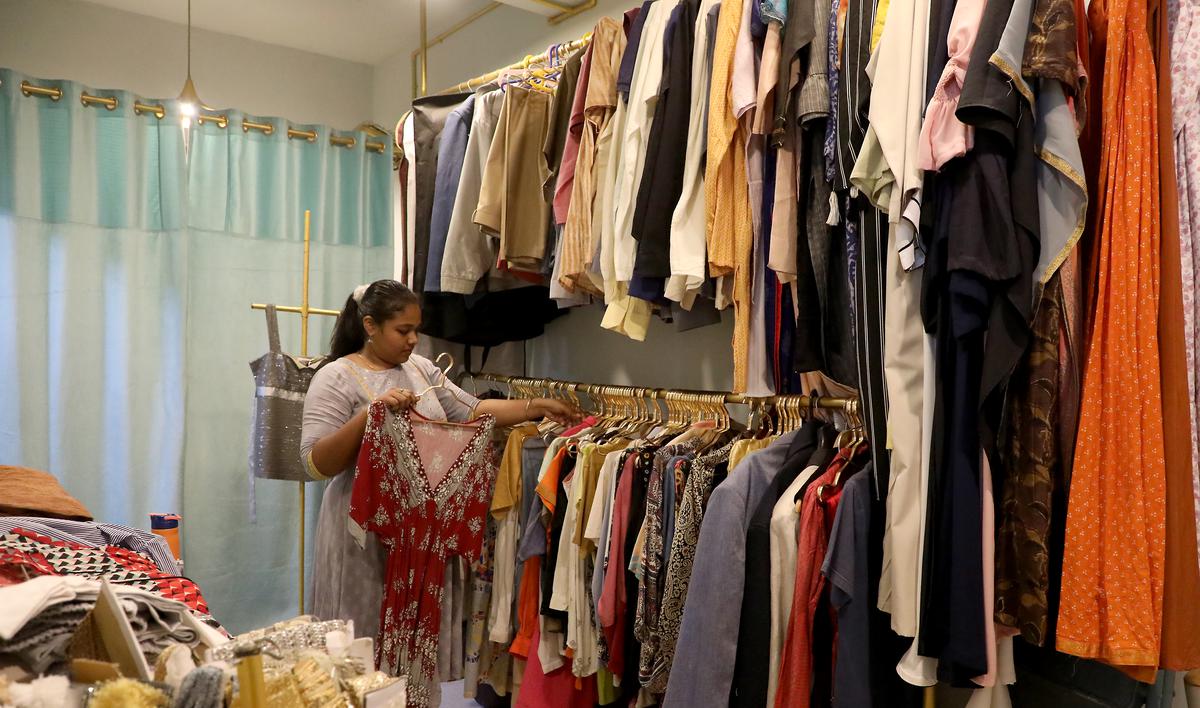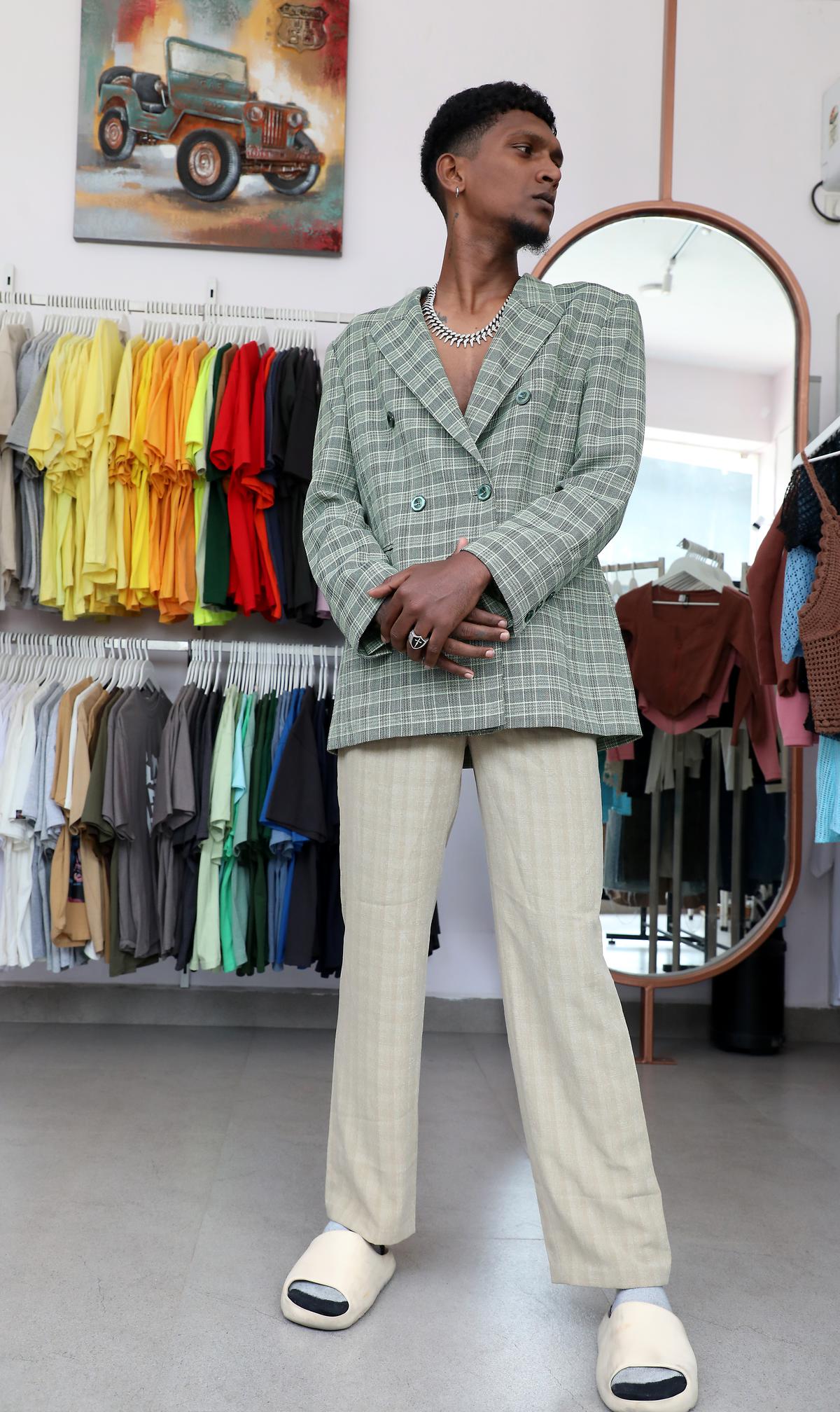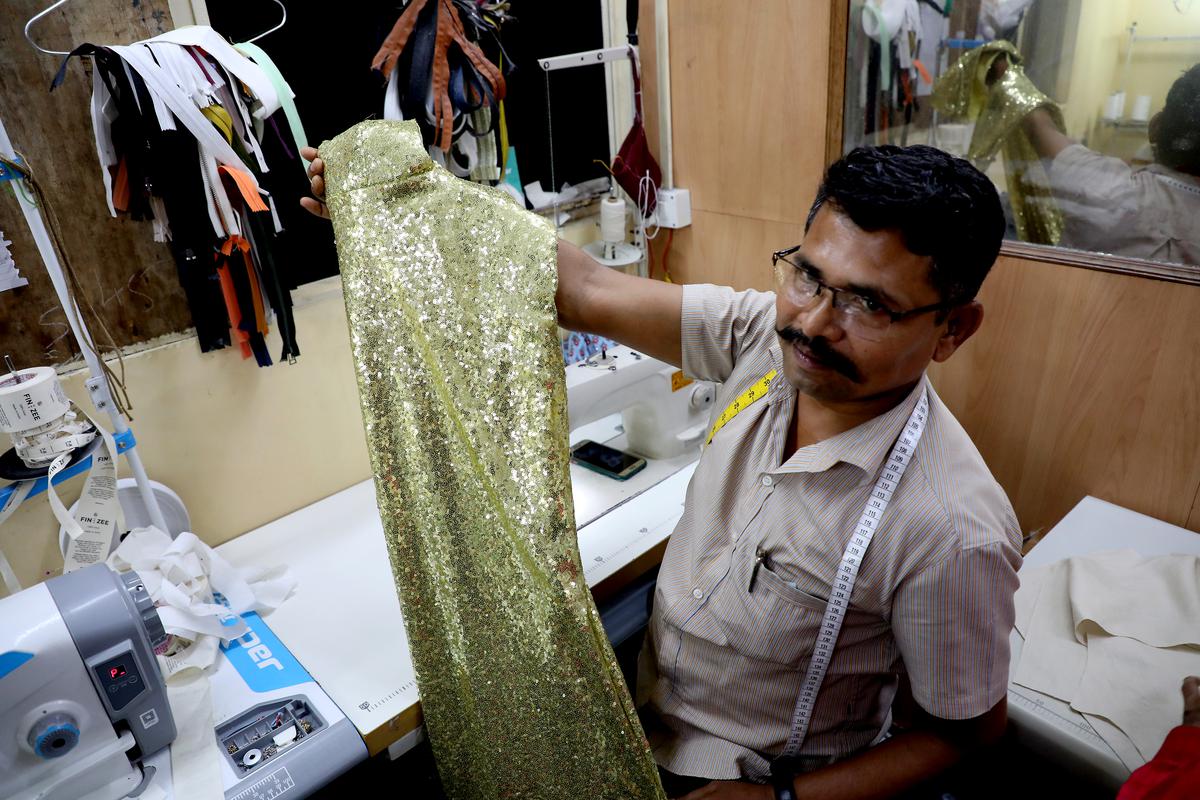Models pose at Escaped closet, a thrift store at Velacherry, Chennai on Thursday.
| Photo Credit: Akhila Easwaran
Finding its legs during the COVID-19 pandemic, thrifting as a conscious lifestyle choice started gaining popularity across the general Indian populace a few years ago, and is still going strong. Being strictly better than investing in fast fashion by extending the lifespan of any piece of clothing that might have found its way to a landfill instead, it comes as no wonder that proponents of sustainability everywhere recommend thrifting or investing in slow fashion.
The far more affordable prices and the possibility of finding one-off vintage or statement pieces also attract throngs regardless. While the pandemic mainly saw the surge of Instagram-based thrift stores, Chennai now has multiple thrifters taking their stock offline as well: Escape Closet, The Rebirth Collective, The ReLove Closet and ZIPLINE Thrift Store, among others.

Sara, Store Manager of Zipline displays the thrift clothes in the store at Casa Major Road on Wednesday.
| Photo Credit:
Akhila Easwaran
Thrifting is often polarising as well, however, and the average consumer will always, quite validly, have misgivings. For one, where do these stores source their clothing from? It depends, say the proprietors.
The Rebirth Collective, launched under Wasted 360 Solutions, opened its physical thrift store’s doors around a year ago. Almost all of their clothing comes from the drop-offs they receive, but they take extra care to segregate items that still have life in them from the unsalvageable. ZIPLINE, on the other hand, sources most of its thrifted items from charities like old age homes that have no use for certain kinds of clothing.
Breaking myths
Sara P, store manager of ZIPLINE Thrift, debunks some misconceptions : “Many customers seem to think that thrift clothing is the faded or damaged clothing you usually find in local donation boxes, but that is not the case. Passing multiple quality checks and following fabric conditioning and sanitisation, our clothing is as good as new and often even better, considering we embroider, dye, and even hand-paint many of the pieces.”

Model poses at Escaped closet, a thrift store at Velacherry, Chennai on Thursday.
| Photo Credit:
Akhila Easwaran
The ReLove Closet, act most like mediators, taking clothing directly from sellers and putting them up for prospective buyers to see on their website. Despite not having a physical store, their collections come offline in their large-scale pop-ups across the city. ReLove’s quality checks are quite stringent, as founder Sruti Ashok explains, “we have a lot of quality checkpoints and even the tiniest of defects does not pass through. Unless it is a designer item, in which case we specify the wear and tear, you will not be able to find a single stain.”
When asked what happens to those that do not qualify, she adds, “since our customer base will not buy these items, we donate them to organisations and charities that can make better use of them, and recycle the rest which cannot be worn.” Escape Closet is a bit of an outlier here, with branded export surplus comprising more than half their store — their thrifted wear is taken from across the country, or even imported in.
Affordable aesthetic
The Rebirth collective
But who is the target audience? Most of the items on sale turn out to be women’s Western wear, trendier clothing that most charities cannot make use of but, once sufficiently restored, appeals to the younger generations. Buyers are usually students who appreciate both the affordable tags and the sustainable cause. The prices at each of these stores hovers around ₹500–600 for most items, going up to around ₹800 at Rebirth and ZIPLINE and ₹1,500 at ReLove and Escape, although the designer items may be sold for higher accordingly.
Escape Closet is peculiar, however, for all their items are unisex and promote gender fluid fashion. Owner Priyanka S. K., who has a background in fashion from NIFT, explains her motivations for starting her store, “Escape Closet was started less for the environmental cause and more because I have a strong interest in fashionable streetwear, which is not easily accessible in Chennai. My goal was to bring affordable fashion to Chennai.” You can find baggy cargos and oversized t-shirts in every colour, and varsity, denim and even racer jackets in store, alongside their upcoming collection of Escape Originals.

Alteration department of Zipline thrift store at Casa Major Road, Chennai.
| Photo Credit:
Akhila Easwaran
The online thrifting space came with its own set of problems — issues related to unreliable stores and quality, as well as sizing issues. Ushma Kansara, store manager of The Rebirth Collective, says, “it is better to have a physical thrift store, which is why our space here also hosts between 15 and 20 other environment-friendly brands. The biggest challenge has been changing people’s mindsets and prejudices towards thrifting, but once people see past that, they can discover the many cool things you can’t find elsewhere, especially at low rates.”